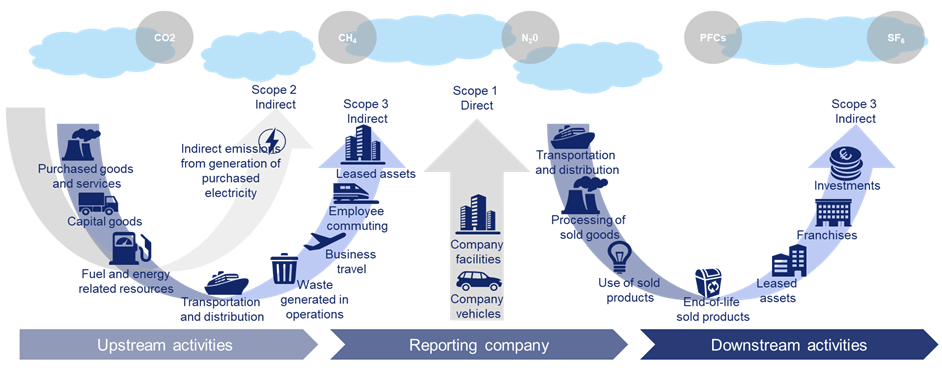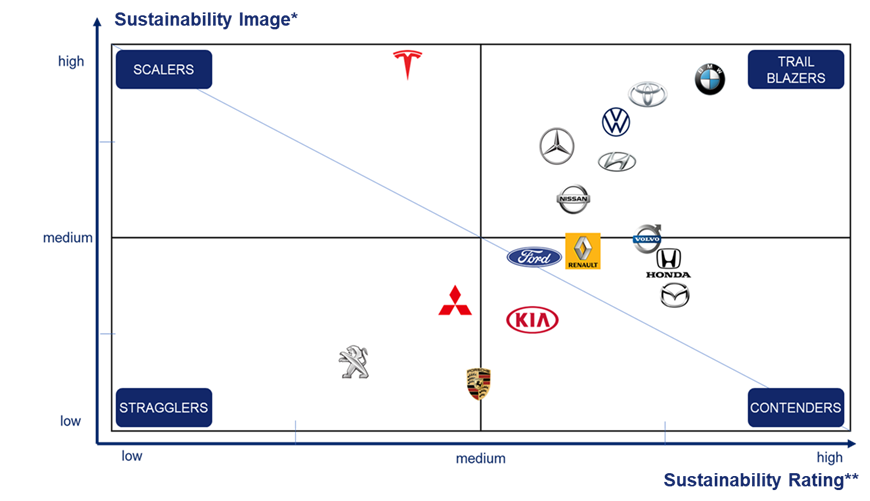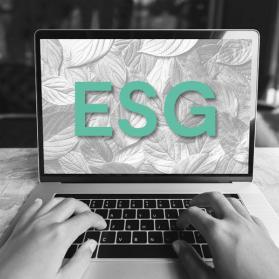Acting instead of reacting to be able to play in the sustainably oriented business: External requirements and regulations with regard to environmental sustainability have been increasing for some time and are obliging companies to act. In the future, car manufacturers will have to be measured, for example, by their compliance with the standards set by the Supply Chain Act.
Efforts to meet climate targets are increasing. In addition to political resolutions such as the Paris Climate Agreement or the European Green Deal, many companies are also demanding significant climate protection efforts from suppliers and vendors. Failure to comply could result in exclusion from market segments or loss of competitiveness. And last but not least, the company's own employees are even more enthusiastic about their employer if it credibly does something for climate protection. For example, CO₂ emissions must be reduced by 262 million metric tons in order to achieve the German climate targets by 2030 erreichen. This target is broken down by emitting sectors, and here the mobility sector plays a crucial role: Worldwide, it accounted for around 24 percent of CO₂ emissions in 2018. The automotive industry therefore plays a key role in reducing these emissions.
Sustainability in the supply chain
The term sustainability is used in many different ways. From the perspective of a management consultancy, we understand sustainability as a social as well as a corporate challenge and see it as an opportunity: We want to look at aspects of sustainability management in a differentiated way and develop corporate benefit potentials from them. A business-as-usual is not helpful in this context, because it is much more a question of the future viability of a company. Hans Carl von Carlowitz (1645-1714) already recognized the central importance of wood as a raw material for the construction industry, energy production and ore extraction. The resulting decrease in wood stocks threatened a raw material crisis, whereupon von Carlowitz developed systematic forestry, which in turn influenced forestry worldwide. Already this early insight shows that it is better to live off the interest than to consume the capital. A further development of this approach is the definition of sustainability by Gro Harlem Brundtland in the report "Our Common Future" (1987): "Sustainable development meets the needs of the present without compromising the ability of future generations to meet their own needs." Thus, today the topic of sustainability can be understood as an open learning process, which is reflected in the so-called triple bottom line of sustainability (ecological, economic and social).
Due to the globalization of economic cycles, more and more companies have relocated many of their production steps to distant countries. Germany is particularly strongly integrated into international supply chains. The raw materials for many products, as well as the products themselves, are mined and manufactured in developing and emerging countries under unacceptable environmental and working conditions. On March 3, the German federal cabinet passed the "Draft Law on Corporate Due Diligence in Supply Chains", which obliges German companies to meet their global responsibility for better environmental and working conditions.
From 2023, the German Supply Chain Act will initially apply to companies with more than 3,000 employees. One year later, it will also apply to companies with more than 1,000 employees. Under the UN Guiding Principles on Business and Human Rights, companies are required to determine the extent to which their business activities may lead to human rights violations. The due diligence obligation relates to the company's entire supply chain - from raw materials to the finished sales product. This means that transparency must be created across the entire supply chain and production must be aligned more closely with the sustainability dimension. In addition to the social dimension with regard to the supply chain, the environmental dimension is also playing an increasingly important role. Companies need to evaluate and understand their supply chains in detail and create transparency.
In the context of an OEM, the production of a vehicle always has material and energy side effects. By taking a company-internal view, the physical processes can be analyzed and thus opportunities can be identified to improve sustainability performance. What OEMs are already achieving internally in terms of product recycling, for example, presents them with new challenges externally as a result of the new emission reduction targets for their fleets. This is because the question arises as to what extent sustainability performance can also be influenced in the use of the physical product (vehicle). Here, for example, the EU Commission's climate target plan for 2030 stipulates that there must be a 50% reduction in CO2 emissions per km from passenger cars compared with the 2021 target.
In order to achieve this ambitious goal and to be able to measure it transparently with regard to the ecological sustainability dimension, internationally valid reporting standards are required, such as the Greenhouse Gas Protocol, with which emissions can be evaluated professionally. Scope 3 (according to the GHG Protocol, see Figure 1) plays a particularly important role here, analyzing the emissions that arise from the company's supply chain, including product use by the customer. In addition, concepts that take a holistic view of mobility, such as smart mobility approaches, are becoming increasingly important.

Figure 1: Own illustration based on Greenhouse Gas Protocol
How well are automobile manufacturers positioned for sustainability?
In the course of various projects with our clients on the subject of sustainability, we at Detecon repeatedly encounter questions of comparison and positioning of companies in relation to one another. In particular, companies try to emphasize their technological achievements in their sustainable development and thereby build up a positive image vis-à-vis the end consumer. It is not uncommon for the image of a corporation to be determined by long-term strategies and thus to be decisive for business processes.
In order to determine the current situation of companies with regard to the status of sustainability, it is necessary to define parameters according to which an evaluation can be made. In the so-called "Detecon Sustainability Rating Matrix" (Figure 2), two values are examined more closely. On the X-axis, the companies are listed according to current and consolidated ratings (2020/2021) from re-nowned ESG rating agencies. The Y-axis is determined by a Germany-wide survey (2018/2019) and reflects the sustainability image in relation to the brands that are particularly innovative in terms of sustainable drive types. Around 1020 people aged between 18 and 69 were surveyed.

Figure 2: own illustration
*Statista: 1,021 interviewees; 18 to 69 years old; Germany 2018/2019.
**Valuation based on selected renowned ESG rating agencies (S&P Global, CDP Climate Change, Sustainalytics, MSCI)
ESG Ratings
In the financial world, this refers to a rating of a company's creditworthiness, which is relevant when granting loans for new investments. In the last decade, the issue of sustainability in investment management has become increasingly important, so that rating agencies include sustainability aspects in their decision-making processes. ESG (Environment, Social and Governance) are the three pillars on which sustainable ratings are currently built. ESG rating agencies measure according to various aspects, including the extent to which a company's commitment to ESG risks is reflected and how these are managed. In addition, a company's resilience to long-term ESG risks plays a role, as does overall ESG performance across a variety of metrics.
Through the interaction of current brand image ratings and ESG ratings, companies can be classified into clusters and their characteristics can be read off in the "Detecon Sustainability Rating Matrix". This matrix reflects a snapshot based on survey data and renowned ESG rating companies. Strategic and technical developments in the meantime can change the representation of the matrix and influence the evaluation of the rating.
In the following, the respective categories are first described:

Scalers
... have a strong perception among partners and customers through constant market presence and growth. They launch new partner programs, M&A and secure their growth through continuous innovative business ideas.

Trail Blazer
... are appreciated by customers and highly rated by renowned rating companies for their positive market impact. They are pioneers with innovative services and products, paving the way for technology leadership.

Contenders
... are highly rated, but have faced some challenges in market development in the past. Their strategies have great potential for increased market value if key challenges are improved.

Stragglers
...have so far focused their business activities on their core competencies (production of specialized product segments). The commitment to sustainable products and services is expandable.
Highlighting three companies
BMW firmly anchors the topic of sustainability in its corporate goals and constantly offers new opportunities both to rethink internal developments, but also to keep technology leadership high through external partnerships. In particular, the new "Open Call 360° Sustainability" ideas competition promotes opportunities for collaboration in seven fields: Renewable materials, sustainable supply chain and production, mobile intelligence, smart building management, customer-oriented mobility, and new future-relevant and sustainable technologies.
Tesla is one of the few car manufacturers without a history dating back to the 19th century. However, Tesla sparks a high market dynamic by offering sophisticated electric mobility and correspondingly clever accompanying marketing and image campaigns. Exceptional technical solutions combined with a large number of innovations are the basis of the manufacturer's sustainability image. The fact that Tesla focuses exclusively on the production of electric vehicles plays an important role in this. This strategy is also reflected in the Detecon Sustainability Rating Matrix. The dynamics of the company shape the competitive situation.
Porsche as part of the Volkswagen Group, is considered separately in various ratings. Primarily because the carmaker from Stuttgart-Zuffenhausen enjoys an excellent reputation worldwide as a sports car manufacturer and thus stands out from "everyday vehicles". With the all-electric Porsche Taycan in particular, Porsche stands out among the electric cars, but the manufacturer's image is nevertheless associated primarily with the longstanding success of internal combustion vehicles. Initiatives such as "Porsche Impact" allow owners to offset emissions by investing in certified projects. The integration of sustainability issues into the entire value chain at Porsche demonstrates the desired expansion in the corporate goals, which is already bearing fruit and puts the manufacturer in a good position based on the ESG ratings.
Way Forward
It becomes clear what enormous influence the automotive industry has on the topic of sustainability and that successful initiatives can leave a major impact. This is reflected not only in the brand image, but also in the assessment of environmental experts. The increasing sustainability awareness of automotive manufacturers is particularly relevant in the light of the recently announced, more stringent climate protection targets for Germany (due to new EU requirements), which envisage the goal of climate neutrality as early as 2045. In addition, 65 percent fewer greenhouse gases are to be emitted by 2030 than in 1990, compared with a previous target of 55 percent. A reduction target of 88 percent has been set for 2040.
Both companies and every individual are called upon to sustainably design and change the mobility of tomorrow in order to leave a positive impact and contribute significantly to the achievement of the climate targets, but also to the social sustainability standards in the supply chain.
Join Detecon in shaping the change towards sustainable mobility!
Further sustainability insights as well as strategic approaches can be found here.








